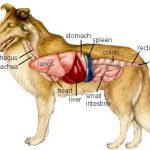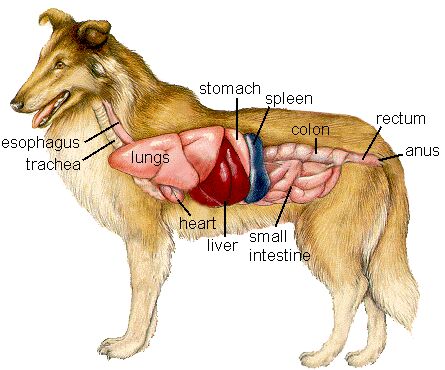The digestive system is complex and can be affected by many factors, such as the dog’s lifestyle or his mental attitude, as well as by parasite burdens and more sinister disorders. Whilst it is often possible for you to detect that the digestive system is compromised (i.e. not functioning normally),the eventual diagnosis will almost certainly require an extensive and thorough examination by the dog’s vet.
There are some common signs that you will see. Most of these concern the dog’s weight, others affect the formation of feces and some may affect the coat and skin quality. It is very easy to make a wild guess and assume that there is an obvious explanation to these problems but it is rarely that simple.
Body weight changes
The underweight dog may have a worm problem but weight loss can also be caused by malabsorption; both explanations are often accompanied by a dry coat with a scurfy skin. The ‘fussy feeder’ may also present underweight but the reason why the dog is not eating needs to be addressed and it may not be as simple as the dog not liking his food.
In all underweight dogs the health and condition of the teeth should be considered as potential causes of the weight loss. Persistent weight loss should always be investigated by the dog’s vet.
The overweight dog could be the result of over-eating or under-exercising but weight gain may also be an indication of disease. Some breeds, such as the Cavalier King Charles Spaniel, are prone to obesity, which may be caused by an inherited heart condition; others, like the Dalmatian, are prone to weight increase from an inherited liver disorder.
Vomiting and Diarrhea
Vomitin g can be a natural reaction in the dog. It can often be caused by overeating or needing to empty the stomach contents in a hurry, perhaps in an escape situation. It may also be caused by stress, illness or disease. Alternatively, it may be caused by swallowing something poisonous and/or irritant, such as shampoo, or something that can’t be digested like the stuffing from soft toys.
g can be a natural reaction in the dog. It can often be caused by overeating or needing to empty the stomach contents in a hurry, perhaps in an escape situation. It may also be caused by stress, illness or disease. Alternatively, it may be caused by swallowing something poisonous and/or irritant, such as shampoo, or something that can’t be digested like the stuffing from soft toys.
In other cases vomiting can be a sign of gastritis (inflammation of the stomach).
You should always monitor the frequency and amount of vomiting. Persistent vomiting leads to dehydration; if this is the case, veterinary attention should always be sought.
Loose feces (diarrhea) should also not be left unmonitored as, again, this can result in dehydration. As with vomiting, diarrhea can be caused by a stress reaction but it can also be a sign of illness or disease. In a stressful situation it is normal for a dog to have diarrhea but if the problem continues after the dog has been removed from that situation, veterinary advice should be sought.
Caution
In the grooming salon you will see dogs on a regular basis. You can therefore monitor them for signs of weight loss or weight gain. You can also keep tabs on, and record the frequency of, parasite control.
Learn which breeds are subject to obesity through an inherited disease and those breeds that are predisposed to malabsorption so that you know what signs to look out for and can alert the owner to a potential problem.
If the affected dog is not in one of the above categories, it may be appropriate to discuss and recommend a diet or lifestyle change, or parasite control.
In the otherwise healthy dog, vomiting and diarrhea may be the result of stress from traveling to the grooming room or from the actual grooming process. If these signs existed prior to the visit, if the dog is unwell or the problem continues after the dog has left the salon, veterinary advice should be sought.
The digestive system is complex. Don’t ever assume that you know what the signs you detect relate to. Veterinary advice is certainly needed before a diagnosis can be made.

